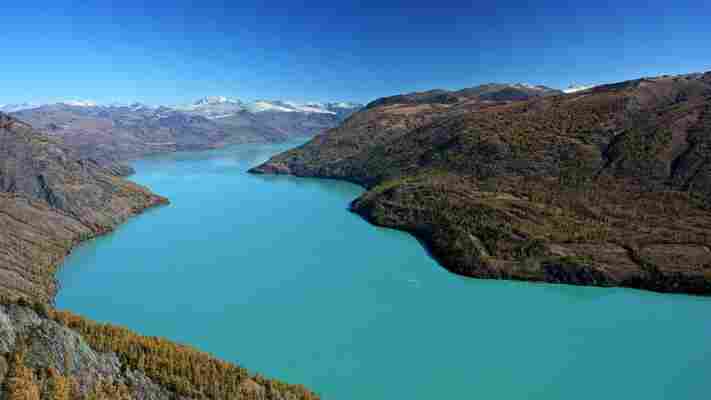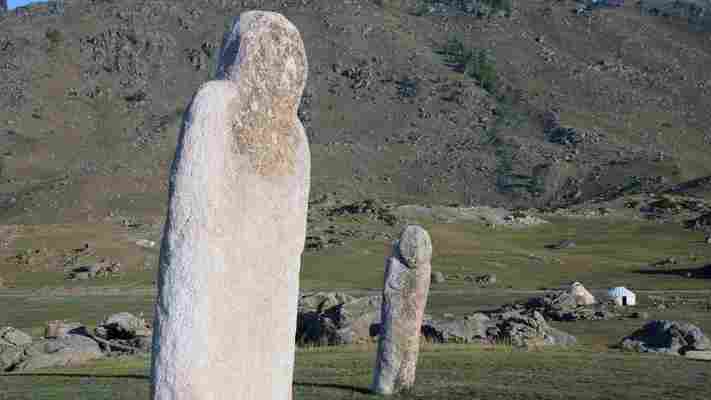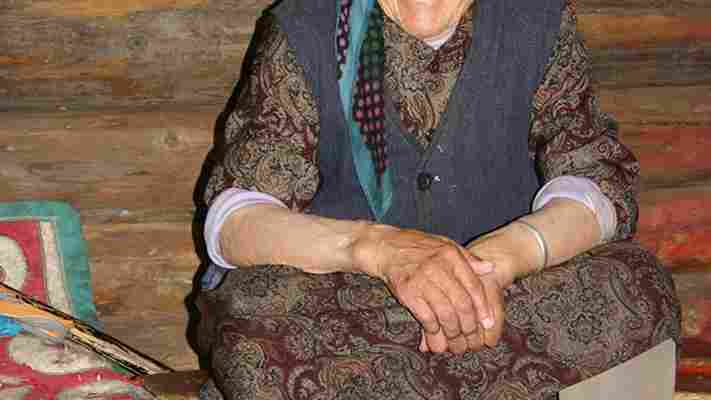Article continues below
In the high mountains of northwestern China, the village of Hemu is a place where time stopped long ago.
Here I met Natalya Kirova, a local Tuwa woman who was selling reindeer antlers as aphrodisiacs in the local apothecary shop. Not long after, I found myself hosted in her rustic log cabin. Its walls were hung with animal skins, and there was the ubiquitous shrine to the great Genghis Khan.
In her home left behind by Russian loggers in the early 20th Century, Kirova talked of mountain spirits, wood sprites and local superstition, and recounted a humorous tale of how Khan’s army invented the hamburger by placing meat under their saddles to tenderise it while they rode. Her son is a throat singer, a profession once exclusive to communing with spirits, but she told me that he now mainly performs for tourists.

Kanas Lake can be found in China's Xinjiang province, near the borders of Kazakhstan, Russia and Mongolia (Credit: just for fun/Getty Images)
Located on the western shores of Kanas Lake in the Alti Mountains of Xinjiang province, where maps show a collision between China, Kazakhstan, Russia and Mongolia, Hemu developed quite literally in a fish bowl. Here, members of the Tuwa tribe, believed to be descended from the army of Genghis Khan, continue to live as they have for generations, practicing shamanism much like their ancestors did.
It is said that at night you can hear the stones calling to their lost army
A narrow road meanders from the lake into the high mountains where, about a half-hour’s drive from Hemu, numerous stone monoliths are reminders of religious ceremonies that Khan, himself a shaman, conducted there before leading his hordes to conquer Eastern Europe in the 13th Century. The monoliths stand taller than most men – some with features; a face or arms – looking like giant chess pieces spread across rolling emerald-green hills. It is said that at night, especially under a full moon, you can hear the stones calling to their lost army.
Mountain mysticism and centuries of legend have created an enigma being pried slowly open by modern curiosity.
In 2008, the Chinese government announced the creation of a national park that included the already established Kanas Lake Nature Reserve and the village of Hemu. Measuring 10,000sqkm, the park is the largest in western China, encompassing a range of terrains, from grasslands to glaciers.

Giant stone monoliths are reminders of religious ceremonies held by Genghis Khan (Credit: James Michael Dorsey)
The expansion of the Kanas Lake Nature Reserve cracked the boundary between old and new. The once-silent landscape echoed with the excited chatter of tourists who came to snap photos of the cobalt waters of Kanas Lake, unaware of the land’s significance. Roadsides quickly filled with rubbish and cigarette butts, and the new diesel buses spread a dull black line across the once indigo skyline. Rubbish bins are a new concept inside Kanas.
Like most Tuvans living in Hemu, Kirova and her son are eager to preserve their heritage while sharing it with the outside world. Tuvans take their role as stewards of the region quite seriously. For hundreds of years, they have survived off the land, relying on its unpolluted soil and water to provide for themselves and their livestock.
One cannot come here and be unmoved by the beauty
Kirova considers it her duty to impart a better understanding of the importance of the environment. “Progress requires education,” she said with a shrug. “One cannot come here and be unmoved by the beauty.”
In Kirova’s home, animal-bone talismans hang from the ceiling to keep evil spirits from invading our lunch of fermented mare’s milk and sun-dried cheeses, while she told me of life before the outside world arrived. Her craggy face laughed easily, but she admitted apprehension at the invasion of outsiders while also acknowledging that the infusion of tourist dollars has changed her life immensely.

Natalya Kirova is eager to preserve her heritage while sharing it with the outside world (Credit: James Michael Dorsey)
For centuries, this mystical land remained untouched by the modern world. Now, a short, brisk walk from Kirova’s home, hotels share space with apothecary shops offering dried frogs for magic potions. You can order a blended coffee drink in a cafe, and buy eye of newt right next door. Felt yurts of nomadic Mongols dot the land like mushrooms, and herdsmen riding camels wave at passing tour buses. Tourists in sunglasses chat with saffron-robed monks, and a hike on any trail will take you past stone altars hung with prayer flags.
Sundown is spent watching eagle hunters training their birds by Kanas Lake, where soothsayers and fortune tellers love to relate stories of the giant monster that occupies the water. A crudely painted mural nearby shows a cross between a whale and friendly looking dragon, and everyone in Hemu claims to have seen the creature even though no photos of it exist.
Before leaving, I asked Kirova what she wants people to take with them from their visit to this new national park. With an impish grin, she replied that she hoped they would return home with memories of the ancient people who once rode with the mightiest army on Earth, and conquered most of it.
Join over three million BBC Travel fans by liking us on Facebook , or follow us on Twitter and Instagram .
If you liked this story, sign up for the weekly bbc.com features newsletter called "If You Only Read 6 Things This Week". A handpicked selection of stories from BBC Future, Earth, Culture, Capital and Travel, delivered to your inbox every Friday.
Leave a Comment